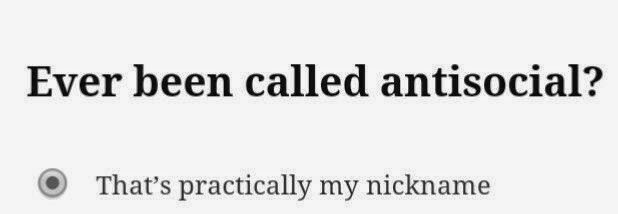Then something started to happen in the beginning of the next year that threw me off; I started scoring as INTP instead.
So at the time, I was really nerding out about my type. I was INFP all the way. I kind of assumed based on descriptions of INTP that they were similar to me only they were more obsessed with logic and more black and white than I was. The truth was, though, that even though I got INFP before, I always scored really low on feeling. The truth was that I didn't gain the same pleasure in helping people that other INFP's did. I was hardly ever deeply touched by things that happened in movies, etc. I never felt any deep, personal connection to animals. I have the distinct memory of being little and telling all my friends I hadn't cried since I was an infant.
The main reason I felt like I couldn't be an INTP was because I loved art so much. My biggest interests were always writing, drawing, and music. And at the time, I was of the understanding that INTP's were above fluffy concepts like that. I began taking multiple different personality tests, and although for a while I would flip flop between the two results, eventually I took a test that was specifically designed to tell me which one of the two I was. And guess which one I was? Yup. INTP.
My score on thinking, though, was still considerably low. The truth is that both descriptions for INFP and INTP seemed too extreme for me. INTP's are typically known as "The Logician" whereas INFP's are known as "The Idealist". While it's true that I'm extremely cynical and bitter about the world, I wouldn't say that I worship all things logical. I'm a writer, so I'm of the belief that not all things have to make absolute sense. Still, my main drive in life is, in short, a quest for knowledge of how things work and why. Does that have to mean that I don't have feelings, though?
Look up any INTP forum on the internet. Most of them pride themselves in their candid sense of apathy and will cartoonishly dismiss anyone who feels anything as incompetent and weak. A few people I know who are familiar with MBTI and all it's theoretical glory began to preach very loudly about how little they felt anything and that anyone they knew that did were clearly idiots, and honestly, it began to get under my skin. Everyone has the same capacity to think logically and to feel, because everyone's human, regardless of what they scored on some test they took on the internet. And honestly, to suggest otherwise is one of the most illogical things you can say about people.
It's similar to the theory that people are either right-brained or left-brained. I used to be very convinced that I was right-brained because of my interests in the arts, but the more I did research on the brain (one of my guilty pleasures, honestly), the more it became clear that it was just a dorky theory, and that in general, humans use both sides of their brains equally. It's only a matter of what they're using them for and when.
 |
| Because there are only 2 kinds of people on Earth... right? |
For a while there, I would analyze myself in hopes of coming to some psychological conclusion. ("I must be a Feeler because I cried the other night" "I must be a Thinker because I suck at comforting my friends") and then it dawned on me- Does it really matter? Sure, this test is a fun hobby, and it helps you get a good general idea of how people think. But has it gone too far? Should I really start distancing myself from ISFJ's because they're so different from me? Should I really start only thinking of people as 4 letters? Should I really start defining myself as those 4 letters and making sure everything I say about myself sounds like I'm quoting some sort of INTP description? *Ahem* NO. I SHOULDN'T And honestly, no one really should; it's pretty unhealthy.
Of course, I've always been fascinated by the brain and psychology, and I'll probably always continue researching different elements about it. I'll probably always go to bookstores and sit in the psychology section for 30 minutes at a time skimming every book I can find about the brain. And, much to my chagrin, I will probably always consider Myers-Briggs when I analyze myself and my close friends. But I've made the decision to not make it such a defining part of the people I know that they're more my own intellectual guinea pigs than human beings. And that includes myself. Am I an INFP or INTP? Sometimes one, sometimes the other. Does that make me an emotional wimp? Does that make me an apathetic jerk? Not at all. Those are ridiculous stereotypes. Myers-Briggs is just a generalized tool to help you pinpoint how you process information; it doesn't divide the whole planet into just 16 precise kinds of people without any room for individuality.
So, in conclusion, does the difference between thinking and feeling matter? No. It really doesn't. But it's still fun.








